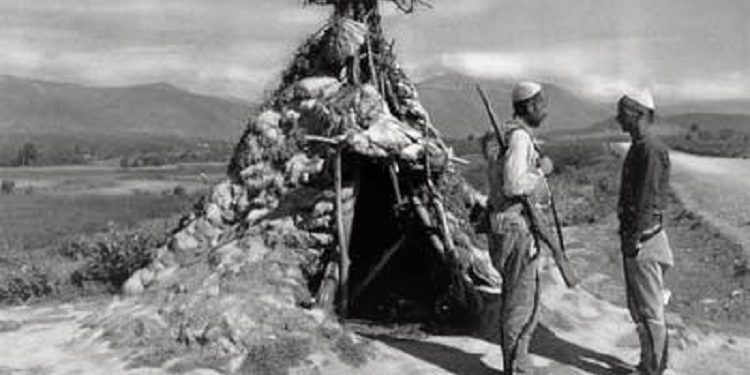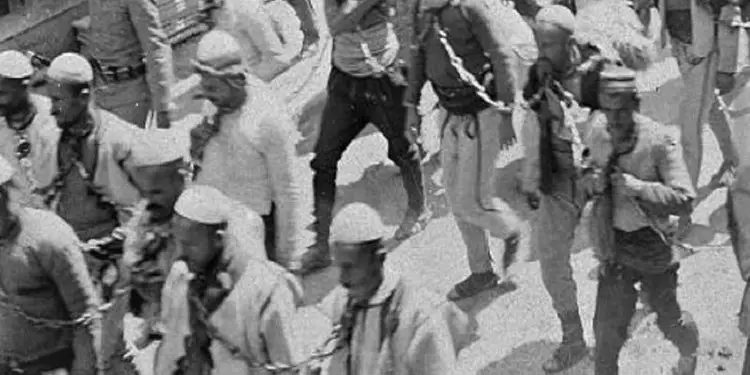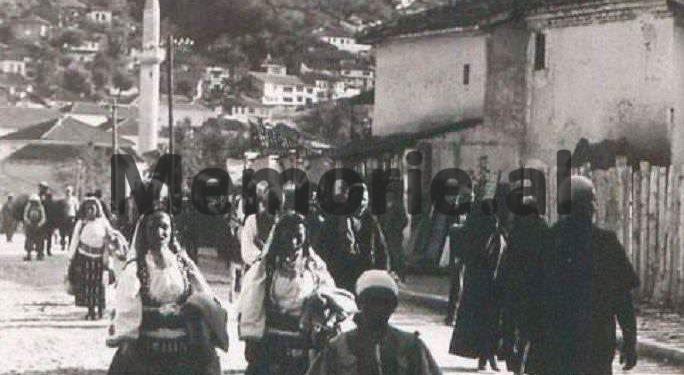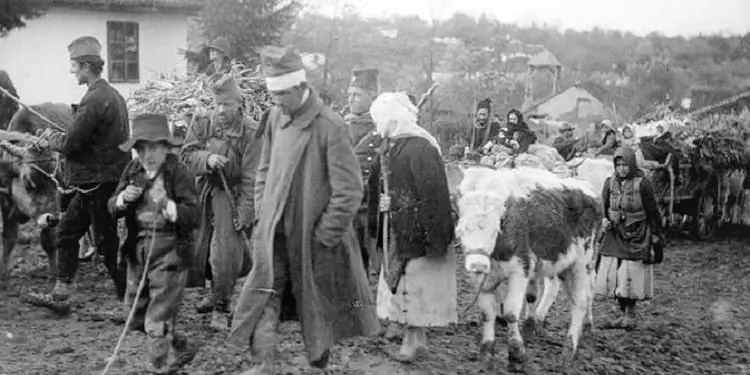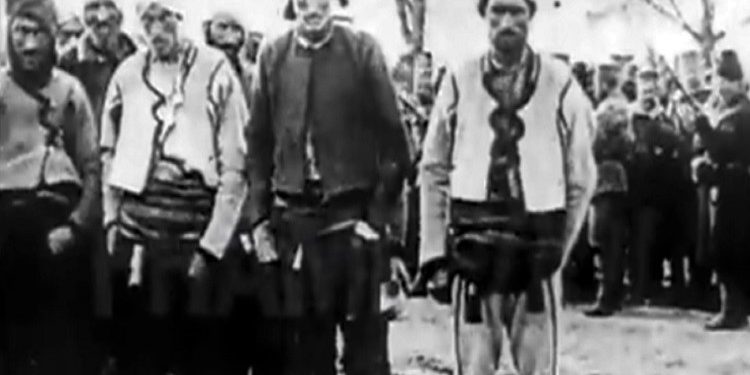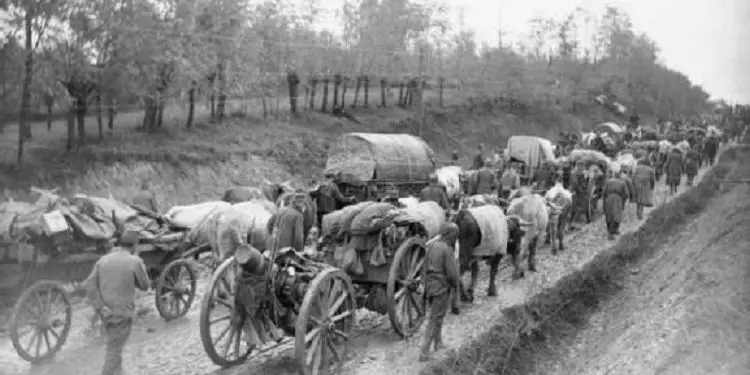From Bashkim Trenova
Part twenty six
MYTH-MYSTICISM, VICTIMOMANIA, RACISM AND SERBONOSTALGIA
ALBANIANS ACCORDING TO THE SERBS
(THE EASTERN CRISIS AND THE BALKAN WARS)
Memorie.al/ “Serbs are descended from the Slavs, a large number of tribes that gave birth to the Slavic peoples. Knowledge about the origins of the history of the Slavs is modest and not so clear. Their name appears for the first time in the 6th century AD, when Byzantine writers start talking about the Slavs….”! (Dushan Bataković, Milan St. Protic, Nikola Samardžić, Aleksandër Fotic. History of the Serbian People. L’Age d’Homme. Lausanne. 2005. Pg. 3.)
These stereotypes were difficult to confirm in the field. Judging by the reports of 1913, even the first heads of Serbian districts did not succeed in this. The head of the district of Dibra noticed not only the asceticism and material misery of the people there, but also that the Arnauts were more moral and hospitable than the Serbs and Turks. Interesting is his impression that Christians were “very deceitful” and ready “to do the most dishonest thing for a few liras”! In the territory of Tetova, the Christians showed great hatred towards the Arnauts and the Turks, even though they were a “peaceful, hard-working people…”, while their houses, as far as hygiene is concerned, were better than those of the Christians.
Establishing the idea of racial superiority and supremacy of the Serbian nation is not always a conscious goal, but also a consequence of “learned” and accumulated stereotypical content.
Of course, the Serbs did not look much better in the depiction of them by Albanian writers. Amidst the national mobilization, propaganda drive and ferocity of the Milosevic regime and radical nationalists, in 1991, a series of lectures – “Serbs and Albanians in the 20th Century” were published in Belgrade. After the remark of some of the participants, according to whom the stereotype “for the eternally bad and ugly Serb” was forced in Kosovar and Albanian literature, historian Andrej Mitrović asked: “Do you have to respond to an aggressive stereotype with the same stereotype?” in the opposite direction?”. Instead of a reasonable answer in the corridors of SANU echoed hollow but poisonous prejudices, which in the last year of the twentieth century will melt into a racist axiom about Albanians as “sediment barbarian of the Balkans”. (1)
1-Vladan Jovanovic. Iz istorije srpske albanofobije. The use of anthropological stereotypes o Albancima. (From the history of Serbian Albanophobia. The use of anthropological stereotypes for Albanians). Concrete br. 159. 22.05.2015.
****
Zoran Janjetovic – historian at the Institute of History for the New History of Serbia, Belgrade:
Thus we come to perhaps the most controversial moment in Serbian-Albanian history. This is the Great War of Vienna (1683-1699) and the so-called Great Migration of the Serbs (from Kosovo and Serbia to southern Hungary, i.e. today’s Vojvodina). After lifting the siege of Vienna, the Austrian troops penetrated deep into the Ottoman territory, up to Kosovo and North Macedonia. Along the way they were joined by Serbian and Albanian Christians, who at first welcomed them as liberators.
However, the participation of Albanians, although a proven fact, is never mentioned in Serbian textbooks. When the winds changed, the Serbs (and some Albanians) were forced to flee the vengeful Turks. Thus, according to historiography no traditionalist, and/or Serbian nationalist, Kosovo was depopulated, which allowed the Albanians, who had previously been only a small minority there, to settle in and drive out or assimilate much of the remaining Serbian population. In textbooks, this version is found in six of the pre-World War II books and four books published after it.
On the other hand, the fate of the Muslim population of Serbia, including Albanians expelled, exterminated or forcibly converted to Christianity during the first Serbian uprising against the Turks (1804-1813), is never mentioned in Serbian textbooks even though they write long and with reasons for the all-important “Serbian revolution” (as Leopold Ranke called it). Sometimes only the wealth that was confiscated from these Muslims is briefly mentioned.
A similar theme can be found in textbooks when it comes to the coverage of the anti-Turkish wars of 1876-1878, which also caused large-scale migrations. The Muslim population (mainly Albanian) fled or was expelled from the territories liberated by the Serbian and Montenegrin armies. However, if these wars are regularly mentioned in all school textbooks dealing with the time, the expulsion of Albanians is not mentioned in any of them.
There is a bad aspect of the First Balkan War, which is never mentioned in Serbian textbooks. We are talking about Serbian war crimes against Albanians. The atrocities started first from the Montenegrins, but soon the Serbian troops also joined here. Although the exact number of victims is still unknown, the fact that the massacre took place is indisputable. However, in order not to tarnish the heroic image of Serbian soldiers, their atrocities are never mentioned in Serbian textbooks. (1)
****
Živorad Stojković – critic, essayist, literary historian, editor of several well-known publishing houses:
When I translated the legend to him, he asked me where Graçanica was, because this name seemed to him to mean something. I showed him the place on the map attached to the book, specifying that the church was located in Kosovo, Champ des Merles (Field of Merles). He asked me to repeat the name of the region in Serbian. Suddenly, almost jumping up, he shouted: “But now this is Albania. Yes, I’m telling you and you’ll see,” he continued, without trying to explain why I was surprised.
“You don’t understand, you have allowed your people and the Albanians to create a hell. You must face the tragedy that awaits you. Hatred is not only blindness, it can also be blackmail. A sense of reality can curb it, being determined and having more faith in you than oppression. I wish your country all the best, but I don’t see them coming, because, I confess, I don’t understand you. (1)
1 – Zoran Janjetovic. De l’ennemi à l’ami, et inversement. Les Albanais dans les manuels d’histoire serbes, 1918-2000. (From enemy to friend and vice versa. Albanians in Serbian history textbooks, 1918-2000). Balkanology. 2002. Vol/VI. No. 1-2.
When I was copying my notes on Malraux, the trial of a “group of Albanian irredentists” was taking place in the Belgrade court. According to the newspaper accounts, one of the defendants, a student, said: “History has sentenced Yugoslavia to death and it is the sons of Kosovo who have the honor to deliver the death blow”! {‘Politics’, 26.4.1984). (2)
—–
Media: Borba; 10.5.1912:
In our relations with the Albanians, we make serious mistakes, for which we will pay dearly later. The biggest mistake was made immediately after our liberation wars, when we expelled thousands of Albanians from the liberated areas. Instead of keeping them in their hearths, making them cherish sympathy and confidence in us, making them for ourselves to associate with us, and, finally, instead of warming them with the rays of to our freedom, to tame them with our culture, to provide them materially and raise them up morally, to embed them in the outskirts of the country, in their new homeland, we expel them without mercy.
These Albanians, who should have been our citizens, a link between us and their patriots in the province of Kosovo, are becoming our sworn enemies. The new kingdom has become hateful to all Albanians in general. Those we expelled from Serbia leave their hearths filled with hatred, with revenge on their lips.
1 – Zhivorad Stojkovic. Une utopia obligatoire? (A mandatory utopia?). Revue des études Slaves. 1984/ 56-3. Pg. 465.
2 – Right there. Pg. 467.
****
Radničke novine; 9.11.1912:
Now the scandal about the actions of the Serbian army against Arnauts came to light, about which the German newspapers write extensively. We do not believe that it will go so far in madness that what we are seeing in the European newspapers will happen, which could compromise and worsen our position. If this is proven, then here we have a “casus belli” – motive for war or for a terrible shame, which carries with it the failure of aspirations and hopes with which the world has been excited for so long.
—
Radničke novine; 13.7.1912:
The Arnaut revolution is today the center where the attention of all political Europe is directed. In all likelihood, Albania is on the verge of autonomy. Finally, the goal for which blood was shed every spring and summer on the land of Albania and Old Serbia was achieved. A nation under Turkey is securing for itself freedom and equality.
The Arnauts were the first to realize that the position of the nations in the Turkish Empire will be fixed, that their existence and development can be ensured only if they take matters into their own hands, if the masses of the people begin to fight for it their rights.
The Arnauts are the first to erase the illusions about the Young Turks; thanks to their specific economic, social and geographical conditions, they had more strength and ability to fight for national autonomy; they fought this war regardless of casualties and lives, going through the most terrible trials. We sympathize with this whole struggle.
—
Radničke novine; 17. 7. 1912:
Arnauts have scored a string of great successes. Wherever they have clashed with the Turkish army, they have emerged victorious. In all the surrounding countries the belief prevails that the Arnauts certainly can and will win. There is no other way out here than to ensure peace at home, giving Albania administrative self-government, which would speed up its cultural development.
—
Radničke novine; 24.7.1912:
In Turkey a powerful revolutionary movement of the Arnauts can easily draw other tribes after itself, which, however, will revolutionize their spirit and increase their courage in the war, which they undertook under the command of Russia together with the governments and reactionary dynasties in the Balkans; our bourgeoisie tries to give them the characteristics of a liberation war. It says: each of the Balkan states wants to free its nation from Turkey.
For this reason, the Balkan kingdoms reached an agreement on the division of lands. How much the liberation of those in the border areas of Turkey is desired, can be seen quite well from the way the “liberators” act in their countries, precisely when they are getting ready for a military expedition, supposedly for the liberation of the territories of Turkey. So, such are the high “liberating” acts of the Russian Tsarist satraps in the Balkans and such are the perspectives of their “wisdom” and “patriotism”.
—
Radničke novine; 2.11.1912:
We are social democrats, very sincere and very great friends of the Albanians, and we want and want their freedom, as well as national and political autonomy in the federation of the Balkan republics. We are against the barbaric view that Albanians are incapable of developing as a nation economically, culturally and politically, just as we reject the low slander, according to which an entire nation is a criminal, if it has some thieves, cursed and bloodsucker
—
Radničke novine; 6.11.1912:
Serbia and Greece want to divide Albania. But, despite the tribal and religious divisions, if the territory where they constitute the majority is divided, the Albanians will be united and ready to defend their national independence from the Serbian and Greek invaders. It does not take much political ingenuity to foresee in time that both the Serbs and the Greeks, if they carry out their plan, will have many bloody clashes with elements foreign to them.
—
Radničke novine; 6.11.1912:
On the stage of history, the “sons of the mountains of freedom” – the Albanians, whose national awakening has taken its form in the demands that were presented in the last uprising – have appeared more and more strongly on the stage of history. Among others, the knowledge of the alphabet and the Albanian language and the granting of autonomy are required.
—
Radničke novine; 13.11.1912:
When the reserve cavalry lieutenant Samuil Amar was killed in Ferizaj, the bourgeois press was outraged by the cunning and ferocity of the Arnauts. But no one took the trouble to ask how much the soldiers of Amar’s arada looted and raped. No one wanted to say that Amari washed away the sins of his soldiers and the sufferings of dishonored Albanian families. Whoever wants to be convinced of this, let them talk orally with the residents of Ferizaj and not only with the Albanians, but also with the Serbs. The Arnauts, therefore, are not “lazy” and “criminals”, but really primitive and simple people, but capable of life, a people who do not tolerate and oppose.
—
Radničke novine; 14.12.1912:
What is being prepared for the people in the occupied areas? Extraordinary laws are being prepared, which the conquerors draw up for the kneeling, the defeated.
First, a member of parliament, in a series of articles, stated: the people in the occupied provinces should not be given either municipal administration or the right to vote. For a long time, the military system and the military court must be preserved there; we must teach this “wild people” life in a “modern” state with rifles and cannons. Shortly thereafter, in a series of dirty press notes, the Belgrade government declares that some “special” laws are being drawn up for the “new provinces”, that is, extraordinary.
If you will ask: why so? Then you will get the answer: This people have not yet matured to take care of its own good and its own government!
—
Radničke novine; 14.12.1912:
One of the most vocal leaders of the Independent Party, Mr. Mihaillo Radivojevic, printed with his own hand a month ago a series of articles about the organization in the occupied areas and in them he gave the “democratic declaration” of his party. He says: Arnauts must be convinced with quick and energetic measures that they cannot live as they did under the Turks. The authorities must use all their power to convince them that Serbia wants to turn this wild tribe into a civilized and hardworking people, since in the civilized countries of the 20th century savagery is not tolerated.
—
Radničke novine; 15.1.1914:
Serbia has become conquering and oppressive. But it has not become so by the will of the people. Therefore, the people should not allow this policy to bring them further damage. He must stop this policy and show to the whole world that the Serbian people are against the government’s policy of oppressing other peoples, and stop the ruling authorities from continuing today’s unfortunate anti-Albanian policy.
—
Radničke novine; 29.3.1914:
The other side of the problem is that the government needs to realize, finally, that bloodshed is the least effective means of scaring the Arnauts and establishing order. We, after all, don’t even need order in a deserted place where there will be no people. Does the Serbian government have the right to devastate this country, kill and expel these residents?
All that remains is to change the regime in these provinces and establish a regime that will also recognize the rights of this population, which fate left under our power. The place of the police and military regime, the place of gun control and oppression – will be taken by civil courts and the constitution. This is the only solution.
—
Radničke novine; 1.5.1914:
These announcements are given by “Politika”, the organ of our chauvinists and provocateurs.
—
Radničke novine; 27.5.1914:
While under the Turkish administration the Serbs could freely develop their trade and sell their goods to the Turks and Arnauts for their gold liras, our military administration snatches from the Albanians everything that can be snatched: grain, corn, cattle, in a word, everything that can be found in the field and at home, today’s local Arnaut insurrections are the result of unrestrained plunder and violence perpetrated against them by our culture bearers…today’s “savage” Arnauts are far more honest and cultured than the invaders theirs and the bearers of culture.
—
Radničke novine; 27.5.1914:
Reading the bourgeois press, which, as if in chorus and according to a special instruction, writes about Arnauts as a non-working and plundering people, as a people who are used to living on the sweat of others, one is stunned by surprise when he knows these people personally and passing through the places where they live, he is convinced that everything our press says about Arnauts is only a lie and its opposite is the truth.
Arnauts are a hardworking people. To be convinced of this, I only had to travel, even by train, through the Kaçanik Gorge and see a modern road, cut through this Gorge, between the rocks, built by the hand of this “wild” people. . In addition, I had to see every piece of land, where there are no stones and rocks, even in the mountains, beautifully worked and planted.
From the railway station “Vuçji Do” through Kaçanik to Ferizaj, the entire area around is populated mainly by the Arnaut nation and nowhere, absolutely nowhere, did I see abandoned and uncultivated land. Moreover, in the flat terrains, the fields are connected to the flows of rivers and streams, while the irrigation canals fall crosswise, thus carrying out an irrigation of the land, really primitive, but very good, so even in the longest absence of rain, the crops have enough moisture.
Arnauts in this part of Kosovo are honest people. That the Arnauts are not looters, the best evidence is the uprising of the Arnauts and their occupation of Skopje, where no one was touched, not only a head or a hair, but not even a peep from the shutter. According to the words of the residents of Skopje, there were also poor and barefoot Arnauts in the uprising, but they did not even abduct or requisition their belongings. Meanwhile, with the arrival of the army and our authorities, the facts speak not in our favor.
—
Radničke novine; 30.5.1914:
Regarding all the phenomena in the Balkans, our journalism has maintained a chauvinistic attitude.
****
Cf. Srpske novine, br.135, June 20, 1876, Page 61:
The essence of all that was said above regarding Serbia and its political propaganda, on the one hand, and the Albanians on the other lies in Serbia’s claims to the Albanian lands, initially Nis and Toplica. To hide these intentions of Serbia, its prince Milan Obrenović hoped to incite hatred between Serbs and Albanians. Even in his proclamation in June 1876, on the eve of the start of the Serbian-Turkish war, he asserted that: “Serbia was forced to start a “defensive” war against the unrelenting and devastating attacks of the savage Albanian-Circassian Bashiz hordes.” . Memorie.al




